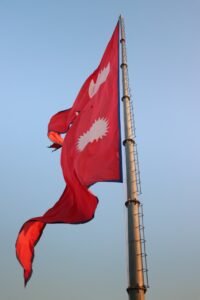Five months after the supreme court order permitted the registration of same-sex marriages, a queer couple’s marriage on Wednesday was finally recognized.
The country has in actuality not passed any legislation pertaining to same-sex unions. However, the Supreme Court has insisted that the people not wait for legislations to start registering unions. This historic ruling will finally allow same sex couples to transfer property and own joint bank accounts just like other heterosexual couples.

Besides Nepal, Taiwan is the other Asian country to allow same-sex couples to legally marry.
Maya Gurung, 35, and Surendra Pandey, 27, a couple who have been together for nearly ten years, got married in a Hindu ceremony at a temple in 2017. This year, they applied for official recognition of their union. Maya Gurung is a transgender woman who hasn’t updated her gender on official documents, while Surendra Pandey is a cisgender male, meaning he identifies with the gender he was assigned at birth.
In western Nepal’s Lamjung district, authorities officially approved and recorded their union on Wednesday. Nepal is one of 36 countries worldwide that permits same-sex marriages. The process began in 2007 when the top court directed the government to stop discriminating against the LGBTQ+ community and ensure they have the same rights as everyone else. In 2015, Nepal’s new Constitution and civil code provided special protections for the queer community and explicitly prohibited discrimination based on sexual orientation, respectively.
Over the last 16 years, Nepal has made significant changes to its legal system following a pivotal Supreme Court decision in 2007. This decision repealed laws against homosexuality and amended various laws to explicitly protect “gender and sexual minorities.”
Same-sex union struggle of Nepal
In 2010, the Election Commission of Nepal included the ‘third gender’ as an option on electoral rolls for those who don’t identify as male or female. The following year, Nepal became the first country to incorporate a third gender category in its federal census.
By 2015, with the introduction of the new Constitution, the government started issuing passports and official documents in three genders. The Constitution granted members of the queer community the ability to obtain a citizenship certificate that recognizes their gender identity. They were also entitled to special legal protections and access to public services.
In early 2015, a government-appointed committee recommended the legal recognition of same-sex unions, emphasizing the principle of equality. However, while Nepal’s new Constitution recognized LGBTQ+ rights as fundamental, it did not officially acknowledge same-sex marriage.
In the significant ruling of June 2023, Justice Til Prasad Shrestha instructed the government to establish a transitional mechanism. Despite the current description of marriage in Nepal’s civil code as between a man and a woman, this mechanism aims to facilitate the registration of marriages for same-sex couples and other non-traditional heterosexual couples.
India decriminalized homosexuality in 2018 but is yet to legalize marriage unions for same-sex couples.











Comments 1